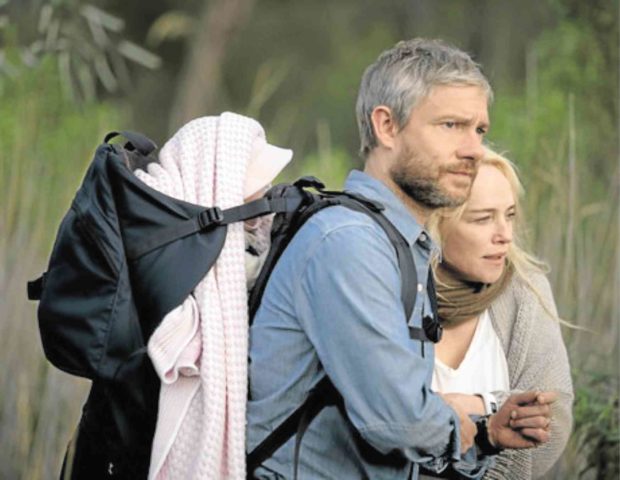“Cargo,” a solid if somewhat derivative take on the zombie apocalypse, depicts the intertwining tales of a family and a runaway trying to survive the onslaught of undead creatures in the Australian Outback.
The visually sweeping but distressing Netflix film shows the extremes of both admirable and despicable behavior, while illustrating a never-ending struggle in the midst of unthinkable catastrophe.
It follows an optimistic survivor, Andy (Martin Freeman), who keeps his wife Kay (Susie Porter) and baby daughter Rosie (played by two pairs of twins) in a houseboat, seemingly away from danger while crossing a river. It doesn’t last, however. While scavenging for supplies in a yacht, Kay is bitten by a zombie, which means she has 48 hours left before she fully transforms into one.
With Kay’s health rapidly deteriorating, Andy gets them off their mobile home to bring her to a hospital. But things don’t go as planned, and he finds himself executing her.
Meanwhile, an Aboriginal girl, Thoomi (Simone Landers), is keeping her “zombified” father from being destroyed by human survivors, as she holds on to the hope that his plight is reversible.
Thoomi and Andy’s paths cross, and with few choices left, help each other to evade the human and zombie threats they encounter along the way.
“Cargo” gives off an agoraphobic vibe, the comely open spaces belying the perils lurking in plain sight. The usual scare tactics are deployed—it’s the time-tested chase between hunter and prey. While the zombie subgenre has been enjoying prominence, thanks to widely popular films and TV shows, it’s getting tricky to distinguish the mythologies behind them.
The film by directors Ben Howling and Yolanda Ramke offers another science-fiction take on the monster, instead of a more magic-inspired one, which is also a smart point of discussion in the story.
The incurable plague is met with force, and this time, an Aborigine tribe is shown joining the fray, albeit briefly. It’s refreshing to see another perspective on zombie-squashing action. Setting it in the Outback also offers interesting analogies with real territorial disputes and the outside threats facing indigenous communities.
The zombies here, despite being the slow-moving type, are no less deadly. They look ghastly and unique—they have yellow slime encrusting their eyes and mouth, quite an unnerving sight to behold. And when resting, they bury their heads in the sand, like the debunked myth about ostriches.
Like most successful zombie apocalypse tales, “Cargo” animatedly exploits a familial connection, central to previous horror-dramas like “Train to Busan” and “The Walking Dead.” Freeman is effective as the beleaguered father and spouse who tries to beat the clock; his believability gives the oft-upsetting story the urgency it needs.
